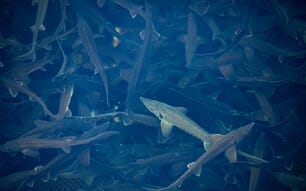Russia's aquaculture output was 172,100 tonnes in 2016. The plans to more than triple this were announced last week by Ilya Shestakov, Russia’s Deputy Minister of Agriculture and the president of the state-run Federal Agency for Fisheries (Rosrybolovstvo).
He said that the Southern Federal District ranks first in in terms of its annual output of commercial aquaculture. Located in the country’s south-western part, it comprises the regions of Rostov, Astrakhan, Krasnodar, Karelia and Murmansk, whose aquaculture industries have the largest annual production, according to the deputy minister.
Some of the agency’s objectives for the coming years include increasing Russia’s production of sturgeon caviar to some 180 tonnes per year, as well as raising the country's share of the global black caviar market to 15%.
In 2017, the Russian authorities are planning to allocate close to RUB 400 million (€6 million) with the aim to co-finance aquaculture investments by local entities. Fish and seafood farmers can apply for funds to buy feed, equipment, as well as finance other related purchases for their activities.
Furthermore, the Rosrybolovstvo is considering to increase the funds that will be available for 2018, as it wants to encourage local fish and seafood farmers to apply for funds, according to Shestakov.
"In 2015, we launched a programme of targeted funding for scientific research in the field of aquaculture," the deputy minister said. "We created a mechanism under which any scientific work that is conducted by state institutions can only be performed in partnership with end users, associations or companies."
"This is very important, so I ask farmers to pay attention to this opportunity and closely cooperate with scientists," he added.


